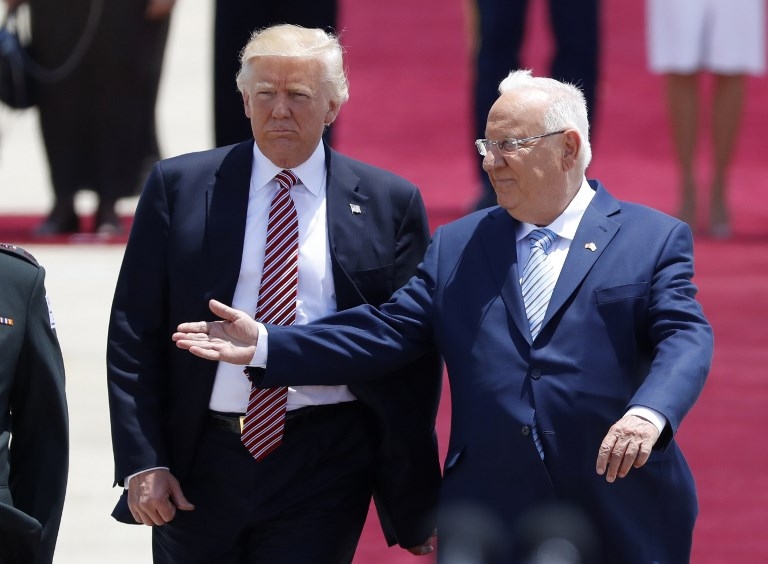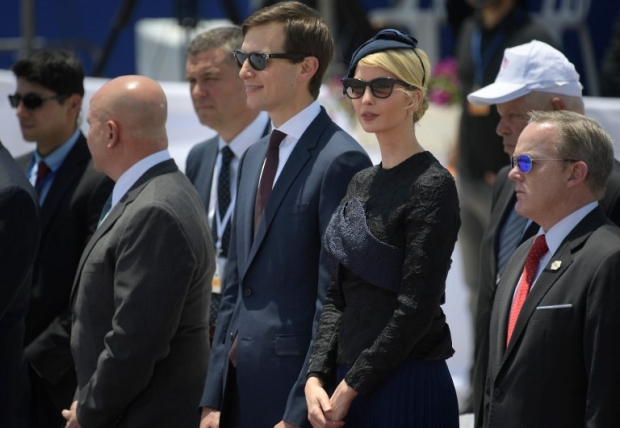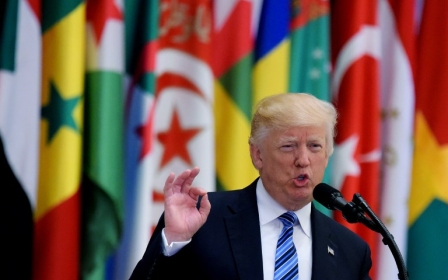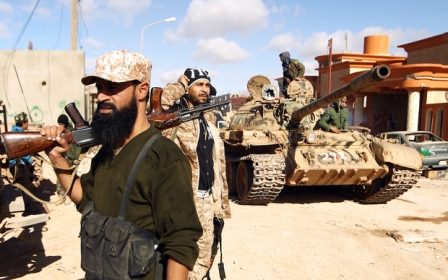Trump lands in Israel on second leg of first foreign trip

US President Donald Trump landed in Israel on Monday as part of his first foreign trip since taking office, with the goal of seeking ways to restart Israeli-Palestinian peace efforts.
Trump will hold talks with Israeli Prime Minister Benjamin Netanyahu later in the day and travel to the occupied West Bank on Tuesday to meet Palestinian president Mahmud Abbas.
Trump's visit is part of his first trip abroad as president and follows an initial stop in Saudi Arabia, where he urged Islamic leaders to confront extremism.
We have the opportunity to advance the peace discussions between the Israelis and the Palestinians
- US secretary of state Rex Tillerson
It also comes as he contends with a raft of problems back home, including a special counsel investigating whether his associates colluded with Russia.
Trump has been widely seen as considerably more supportive of Israel than his predecessor, Barack Obama. He has taken a softer position on the contentious issue of Israeli settlements, suggesting that their expansion rather than their presence might hamper the search for peace.
More than 600,000 Jews live in about 140 settlements built since Israel's 1967 occupation of the West Bank and East Jerusalem, land Palestinians claim for a future state.
The settlements are considered illegal under international law, though Israel disputes this.
The president has also sent mixed signals on the issue of Jerusalem, pledging to move the US embassy there from Tel Aviv, angering Palestinians and delighting Israelis.
"We have the opportunity to advance the peace discussions between the Israelis and the Palestinians," US Secretary of State Rex Tillerson said aboard Air Force One just before landing.
Jerusalem tour
Security was extremely tight, with Israeli police deploying some 10,000 officers.
The alleys and passageways of Jerusalem's ancient Old City, which Trump will visit later in the day, were essentially under lockdown.
Ahead of talks with Netanyahu, Trump will tour two iconic sites in Jerusalem, a city holy to Muslims, Christians and Jews.
The first will be the Church of the Holy Sepulchre, built at the site where Christians believe Jesus was crucified, buried and resurrected.
Afterwards, he is expected to become the first sitting US president to visit the Western Wall, the holiest site where Jews can pray and located in east Jerusalem.
The Western Wall visit drew controversy before Trump even left Washington, when US officials declined to say whether it belonged to Israel.
"Jerusalem was and will always be the capital of Israel," Netanyahu said late Sunday, adding that the Western Wall "will always remain under Israeli sovereignty".
The status of Jerusalem is ultra-sensitive and has been among the most difficult issues in Israeli-Palestinian peace talks.
Israel occupied east Jerusalem and the West Bank in 1967 in moves never recognised by the international community.
It later annexed east Jerusalem and claims the entire city as its capital. The Palestinians see east Jerusalem as the capital of their future state.
Enormous challenge
Trump will meet Netanyahu at 6:00 pm (1500 GMT).
Ahead of their meeting, Netanyahu's security cabinet adopted a series of measures aimed at benefiting the Palestinian economy, moves seen as confidence-building measures requested by Trump.
They reportedly included new building permits for Palestinians in the part of the West Bank entirely under Israeli control, which occurs only rarely.
Most of the West Bank is under complete Israeli control and Palestinians face extremely long odds in being granted building permits in those areas, while Israeli settlement building has meanwhile continued.
On Tuesday, Trump will meet Palestinian president Mahmud Abbas in Bethlehem in the West Bank, visit the Yad Vashem Holocaust memorial in Jerusalem and give a speech at the Israel Museum.
Any leader would face an enormous challenge in seeking to bring the Israelis and Palestinians together for meaningful talks, and Trump's inexperience and domestic political struggles will only add to it.
He has spoken of his self-described deal-making prowess in declaring that the "ultimate deal" is possible, vowing "we will get it done".
"It is something that I think is frankly maybe not as difficult as people have thought over the years," Trump said when meeting Abbas in Washington earlier this month.
Trump has sent mixed signals about how he will approach the Israeli-Palestinian conflict.
He cast uncertainty over years of international efforts to foster a two-state solution when he met Netanyahu at the White House in February.
Criticism of Iran
At that meeting, he said he would support a single state if it led to peace, delighting Israeli right-wingers who want to see most of the West Bank annexed.
At the same time, he urged Israel to hold back on settlement building in the West Bank, a longstanding concern of Palestinians and much of the world.
Trump advocated during his campaign breaking with decades of precedent and moving the American embassy from Tel Aviv to Jerusalem, deeply alarming Palestinians.
He has since said the move was still being looked at.
Trump's seeming openness to at least some of Abbas's concerns has given Palestinians more reason for hope than many may have expected, but still reason to remain wary, some analysts say.
On the Israeli side, Netanyahu heads what is seen as the most right-wing government in the country's history, and members of his coalition were elated with Trump's election.
Some even called for an end to the idea of a Palestinian state.
Trump's actions since have left them disappointed, with the embassy remaining in Tel Aviv - at least for now - and the White House seeking to restart peace efforts.
However, the United States remains Israel's most important ally, providing it with more than $3 billion in defence aid annually.
After Israel and the Palestinian territories, Trump will head to the Vatican along with Brussels and Italy for Nato and G7 meetings.
New MEE newsletter: Jerusalem Dispatch
Sign up to get the latest insights and analysis on Israel-Palestine, alongside Turkey Unpacked and other MEE newsletters
Middle East Eye delivers independent and unrivalled coverage and analysis of the Middle East, North Africa and beyond. To learn more about republishing this content and the associated fees, please fill out this form. More about MEE can be found here.




